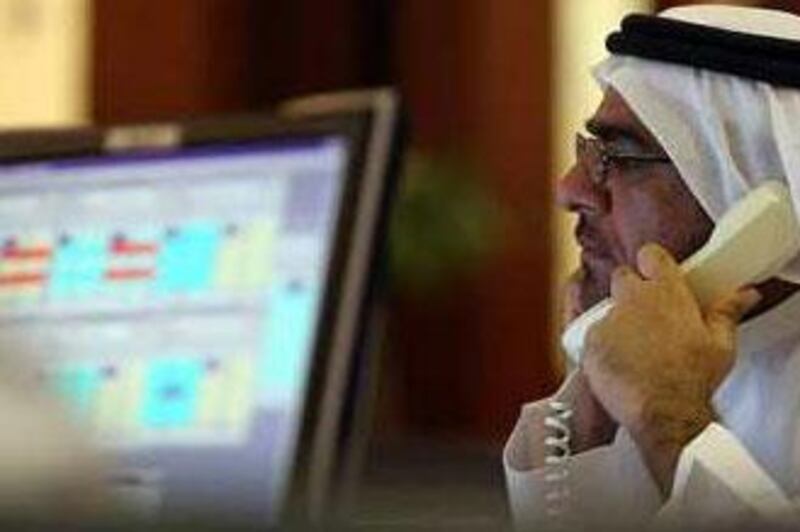Investors have returned to local markets, helping stocks recover some of the losses triggered by Dubai World's debt restructuring announcement. Shares on the Abu Dhabi Securities Exchange yesterday gained the most since March, ending the day 3.9 per cent higher, while the Dubai Financial Market General Index advanced 1.2 per cent.
"Investors returned to pick through the ruins," said Gianluca Giardina, the senior fund manager at EIS Asset Management, an arm of Emirates NBD. "They returned to reassess the situation and correct mistakes. "The way the news [of the Dubai World restructuring] came out was messy. In these situations markets will always overreact. It goes back to human nature to act on impulse." Dubai World's announcement that it was seeking to restructure US$26 billion (Dh95.49bn) of debt affected stock markets around the world during the Eid holiday, and on the two days when the Dubai and Abu Dhabi exchanges traded they shed about 10 per cent of their value.
The bourses were closed for the rest of the week for Eid al Adha and National Day festivities. Some analysts expect investors will now increasingly differentiate between the two exchanges, which have been closely related in the past. "There will be a further diversion between the two exchanges," Mr Giardina said. Dubai's announcement that the Government will not guarantee the debts of its state companies has led analysts to reassess the risk of doing business in the emirate.
Several Dubai Government-owned companies have had their credit ratings downgraded to junk status, and banks with exposure to them also had their ratings lowered. "We believe that many foreign institutions fail to distinguish between Dubai and Abu Dhabi, and place both emirates under one umbrella," Rasmala, a regional investment bank, said in a report. "Furthermore we believe that this may be the case for the entire region as the loss of credibility extends beyond the UAE."
Dubai's trading session was volatile as investors absorbed the possible effects of Dubai World's restructuring on stock markets. "Assessing the impact - will take some time as conditions clarify," Deutsche Bank said in a report. "We believe that attractive opportunities will arise as the uncertainties of the last few days are reflected in asset valuations and before transparency improves." Arabtec, the large construction company that is considered heavily exposed to major Dubai projects, ended the day 5.6 per cent lower. But developers Sorouh and Emaar regained some of their earlier losses, closing 4.8 per cent and 3.6 per cent higher respectively. Drake and Scull, the specialist engineering company, gained 8.2 per cent.
Most banks continued to suffer. Emirates NBD, the country's largest lender by assets, lost 4.8 per cent, while Abu Dhabi Commercial Bank shed 6.6 per cent. Local banks could be forced to set aside provisions to cover their lending to Dubai World, while borrowing costs are also expected to rise. The banks may also be forced to raise their Tier 1 capital as their overall economic recovery is delayed.
Some experts are upbeat about buying opportunities. EFG-Hermes, the Egyptian investment bank, has pointed investors to attractive buys in sectors with little exposure to banking or property. "Outside of the real estate and banking sectors, we believe investors can find some attractive buying opportunities," the bank said in a report. "That said, for long-term investors some real estate names might be worth considering sooner than expected, especially if they continue to fall hard."
While UAE markets bounced back from the turmoil of the past week, the effects of the Dubai World debt restructuring continued to be felt across the region. Oman's MSM30 Index lost 1.2 per cent as Bank Muscat, the country's largest lender, fell 5.9 per cent. Three Omani banks, including Bank Muscat, disclosed a total exposure of 29.5 million rials (Dh281.3m) to the Dubai conglomerate. @Email:uharnischfeger@thenational.ae






